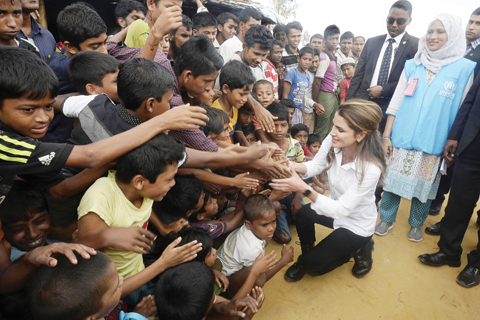Jordan queen decries 'persecution' - Bangladesh says burden 'untenable'
 BANGLADESH: Jordan's Queen Rania meets Rohingya refugees during her visit to the Kutupalong refugee camp in Ukhia yesterday. - AFP
BANGLADESH: Jordan's Queen Rania meets Rohingya refugees during her visit to the Kutupalong refugee camp in Ukhia yesterday. - AFPGENEVA: Nations have pledged $344 million to care for Myanmar's Rohingya refugees in Bangladesh, an "encouraging" step in the response to the intensifying crisis, the UN said yesterday. Many of the funds for the minority Muslim group, who have fled from violence in the northern part of Myanmar's Rakhine state, were promised at a high-level conference in Geneva, co-hosted by the United Nations, the European Union and Kuwait. Kuwait announced its commitment to donate $15 million, offered by official and public bodies.
Kuwait's Deputy Foreign Minister Khaled Al-Jarallah said the UN Security Council is facing an ethical and humanitarian responsibility before a political or legal one towards the disgusting crimes committed against the Rohingya people. He called on the authorities in Myanmar to take the needed procedures to avoid such violations as well as apply the law, security and freedom of living and transport without any religious or ethnical discrimination. Jarallah urged them to "cease the practice of stripping the Rohingya minority of their right of citizenship, which as a result deprives them of the right to property and employment".
He expressed Kuwait's gratitude towards the distinguished efforts exerted by Bangladesh in hosting the Rohingya refugees and alleviating their suffering. Kuwait Red Crescent Society is currently working with Turkey's Humanitarian Relief Foundation (IHH) in distributing aid supplies in Cox's Bazar, a city located about 70 km from the Myanmar border, in collaboration with the Bangladeshi army. The humanitarian aid campaign will continue until today.
The UN says it needs $434 million to provide support through February for the 900,000 Rohingya who have fled across the border, as well as the 300,000 local Bangladeshis hosting the influx. "We've had an encouraging morning," the UN's humanitarian chief, Mark Lowcock, told reporters. A total of $344 million has been raised so far, a final UN statement said. Some of the money was promised in the run up to the conference and Lowcock said he expected more commitments in the coming days. A group of nations had also offered $50 million of in-kind donations.
Lowcock stressed the importance of countries actually delivering the cash, with the UN having confronted unfulfilled pledges in past crises. "Pledges are one thing," he told reporters. "It's really important to us that the pledges are translated as soon as possible into contributions". With no apparent resolution to the crisis in sight, Lowcock noted that there may be a need to raise more funds again next year.
The head of the International Organization for Migration, William Lacey Swing, called the wave of Rohingya fleeing to Bangladesh "the fastest growing refugee crisis in the world". "It is, in its own way, a nightmare," he added. Bangladesh's government and the community in the Cox's Bazar area have been broadly praised for the response to Rohingya refugee influx, notably for keeping the border open.
Rohingya refugees have headed for Bangladesh in huge numbers after militant attacks on Myanmar security forces in Rakhine sparked a major army crackdown on the community likened to ethnic cleansing by the UN. Rohingyas have been systematically deprived of basic rights over decades in majority Buddhist Myanmar. In the latest crackdown, Myanmar's security forces have fired indiscriminately on unarmed civilians, including children, and committed widespread sexual violence, according to UN investigators.
Bangladesh called on Myanmar yesterday to allow nearly 1 million Rohingya refugees to return home under safe conditions, saying that the burden had become "untenable" on its territory. "This is an untenable situation," Shameem Ahsan, Bangladesh's ambassador to the United Nations in Geneva, told a UN pledging conference. "Despite claims to the contrary, violence in Rakhine state has not stopped. Thousands still enter on a daily basis."
Vital humanitarian aid must continue, Ahsan said, adding: "It is of paramount importance that Myanmar delivers on its recent promises and works towards safe, dignified, voluntary return of its nationals back to their homes in Myanmar." Bangladesh's interior minister was in Yangon on Monday for talks to find a "durable solution", he said.
But Myanmar continued to issue "propaganda projecting Rohingyas as illegal immigrants from Bangladesh", Ahsan said, adding: "This blatant denial of the ethnic identity of Rohingyas remains a stumbling block." Myanmar considers the Rohingya to be stateless, although they trace their presence in the country back generations.
Filippo Grandi, UN High Commissioner for Refugees, later told journalists that the two countries had begun talks on "repatriation". Conducive conditions have to be "recreated" in Rakhine, he said. "This must include a solution to the question of citizenship, or rather lack thereof for the Rohingya community," Grandi said.
Jordan's Queen Rania visited Rohingya refugee camps yesterday and called for a stronger response from the international community to the plight of the Rohingya who fled to Bangladesh to escape "systematic persecution" in Myanmar. "One has to ask, why is the plight of this Muslim minority group being ignored? Why has the systematic prosecution been allowed to play out for so long?" she asked after touring the camps.










